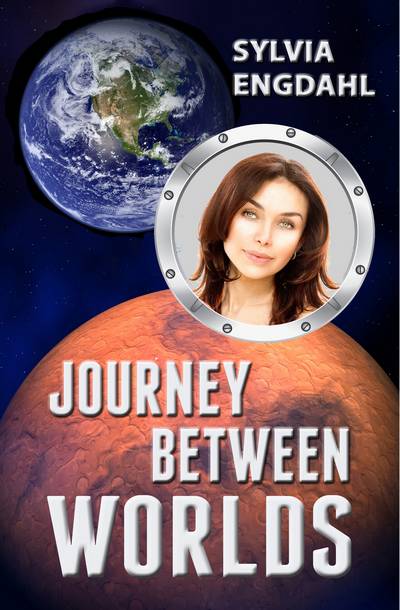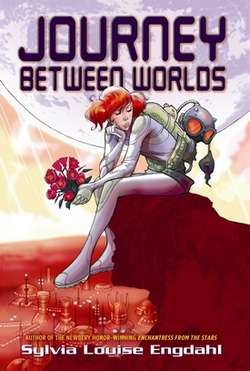
A Response to Some Reactions to
Journey Between Worlds
by Sylvia Engdahl
In 2015 I got the rights to Journey Between Worlds back from the publisher of the 2007 paperback edition and issued ebook editions to replace theirs, which were overpriced. I hoped that at last it would reach the audience for which it was intended, but so far that hasnít happened; there just doesnít seem to be any way to make the readers most likely to enjoy it aware that it exists. Moreover, no one who has read it seems to have noticed the symbolism in the characterization of the storyís heroine.
*
My Young Adult novel Journey Between Worlds, a realistic story about the colonization of Mars, is about ordinary people living on that world. Itís enjoyed more by young women who like romance than by avid sci-fi fansówhile classed as ďscience fictionĒ because of its interplanetary setting, itís not about technology or exotic adventure. Itís mainly a story about human aspirations and human love.
Journey Between Worlds was my first book, written before Enchantress from the Stars although published later. Admirers of Enchantress looking for something comparable tend to be disappointed in it, because itís not at all similar; but why should it be? A writer is not obligated to direct all his or her work to the same people. This is a common problem for authors; some even write under different pen names for readers with different tastes, often because publishers demand it for marketing reasons. But I aim to express my ideas in a variety of ways, not to meet the publicís expectations. In theory, this should give me a wider audience. In practice, few of the readers for whom they were intended discover my lesser-known novels.
Journey has had two hardcover editions and a paperback issued by major publishers, yet despite good reviews it has never reached the audience it was meant for. The publishers marketed it exclusively as science fiction rather than romance, yet science fiction fans arenít likely to sympathize with a heroine who doesnít want to go to Mars. And they arenít the readers who need to be convinced that colonizing Mars is worthwhile. My aim was to appeal to romance readers who may or may not be in favor of space travel, and who wonder whether in a changing world, thereís hope for their descendants to find happiness. And in fact, the 2006 hardcover edition was well received by the romance websites to which I personally arranged for it to be sent; some reviewers said they enjoyed it as adults as well as recommending it for teens, and even that it made them think.
Of course space enthusiasts interested in Martian colonies also like the book. The National Space Society review of the 2006 hardcover edition called it ďA must-read for all future space pioneers who wish to persuade their friends to join them in making that future journey between the worlds of the known and the unknown.Ē But it has remained largely invisible to the non-pioneers to whom I believe it would most appeal.
 Comments at Amazon, Goodreads, and Facebook show that many readers who did find the book loved it and remember it as one of their favorites. Naturally there are critical comments, too, and where these concern the readerís personal lack of sympathy for the heroine, thatís okay. If a character is portrayed as anything but perfect, not everybody will like her (and after all, if she were perfect, the book would be criticized as unrealistic). In this case, some found her particularly unlikable because her attitudes were different from their own and from those most prevalent in todayís society.
Comments at Amazon, Goodreads, and Facebook show that many readers who did find the book loved it and remember it as one of their favorites. Naturally there are critical comments, too, and where these concern the readerís personal lack of sympathy for the heroine, thatís okay. If a character is portrayed as anything but perfect, not everybody will like her (and after all, if she were perfect, the book would be criticized as unrealistic). In this case, some found her particularly unlikable because her attitudes were different from their own and from those most prevalent in todayís society.
But though I donít usually comment on negative reviews, there were several criticisms to which I feel compelled to reply. In the first place, many readers said that the heroine doesnít seem like a modern woman and that her outlook is sexist and obsolete. In the 1970 edition, this is certainly true. I wrote the book in the late sixties, and it did indeed reflect the views still common in that eraógirls wanted mainly to get married and werenít very ambitious with regard to their careers. A lot of revision was done for the 2006 edition to eliminate dated phrasing and assumptions, as well as to update the description of the Martian landscape and some minor references to pre-computer technology that is now obsolete.
Yet despite the elimination of sexist attitudes, a number of reviewers complained that in the 2006 edition Melinda still doesnít seem like a modern woman, let alone like a woman of the futureóand though this too is true, itís not a matter of when the book was written. It is an intentional portrayal of her individual personality. She is shy and dependent (although itís not true as some asserted that she lets her boyfriend control her; on the contrary, her rebellion against his attempt to tell her she canít go to Mars is the deciding factor in her decision to go). If she were typical of her generation sheíd be eager for a trip to Mars! Moreover, there would be no plot conflict, no room for the growth and change thatís the main point of the story. Apparently some of these readers never finished the book (a few stated that they didnít) because by the end of it, her views have changed. Her basic personality hasnít. She still wants marriage and a homeóas most women do today, even when itís not their prime objective. She is still somewhat homesick for Earth, as the average person would be. But sheís looking forward, not back, and her career plans have become more ambitious and more important to her.
If I were writing the book today I would not change Melindaís personality. It is, or is supposed to be, more significant than a mere plot deviceóitís basic to the bookís theme. There is symbolism that my readers, even those who praised the book, seem to have missed. (Iím sometimes accused of spelling ideas out too much, but when I donít make them explicit, they donít get across. I guess I donít know how to be successfully subtle.) Melinda initially clings to what previous generations considered normal and natural, what she has always believed she wants, and sees no need to move beyond the confines of her past experience. So too do most people today cling to the idea that confinement to Earth is ďnaturalĒ and see no necessity for the human race to go beyond the limits of the world where our ancestors evolved. I doubt if any such people grasped this parallel, or even that space supporters who didnít like Melinda did; but it is, in my opinion, quite exact. In both cases the underlying factor is a deep-seated longing for stability and fear of the unknown.
This bring me to the other criticism of the book that I want to comment on. One reviewer said, ďThe author has a definite bias in favor of space colonization.Ē Well, if this is bias I plead guilty. But ďbiasĒ is not the right word. We donít normally call deeply held convictions ďbias.Ē We wouldnít say authors of anti-war novels are biased against war, or that advocates of banning industrial pollution are biased in favor of protecting the environment. Open supporters of a cause donít claim to be impartial, and no book other than a nonfiction survey of an issue should be expected to give weight to views unlike its authorís. I make no secret of the fact that I believe space colonization is essential to the long-term survival of the human race. I recognize that not all readers share my opinion, and itís their right to disagree with it. But to imply that I ought to present both sides objectively in a novel is to ignore the difference between educational material and literature.
Today, in 2017 when there is more public interest in Mars than in the past and SpaceX CEO Elon Musk is actually planning to send people there, Journey Between Worlds is more relevant than ever. Do I believe Martian colonies will be anything like the one in the story? Of course notónot in this century and perhaps not in the next. Early colonies will be small and the residents will undergo great hardship; by the time larger ones are established, lifestyles even on Earth will be very different from what I have described. But I believe the underlying feelings of my characters are a valid portrayal of how colonists will view their society. Like pioneers of every past era, they will think of their lives as normal, however unnatural their goals may seem to others. They will be ordinary people, doing what humans have always done to build a better future for themselves and those who come after them.
Copyright 2017 by Sylvia Engdahl
All rights reserved.
This essay is included in my ebook Reflections on Enchantress from the Stars and Other Essays and in my book Selected Essays on Enchantress from the Stars and More.